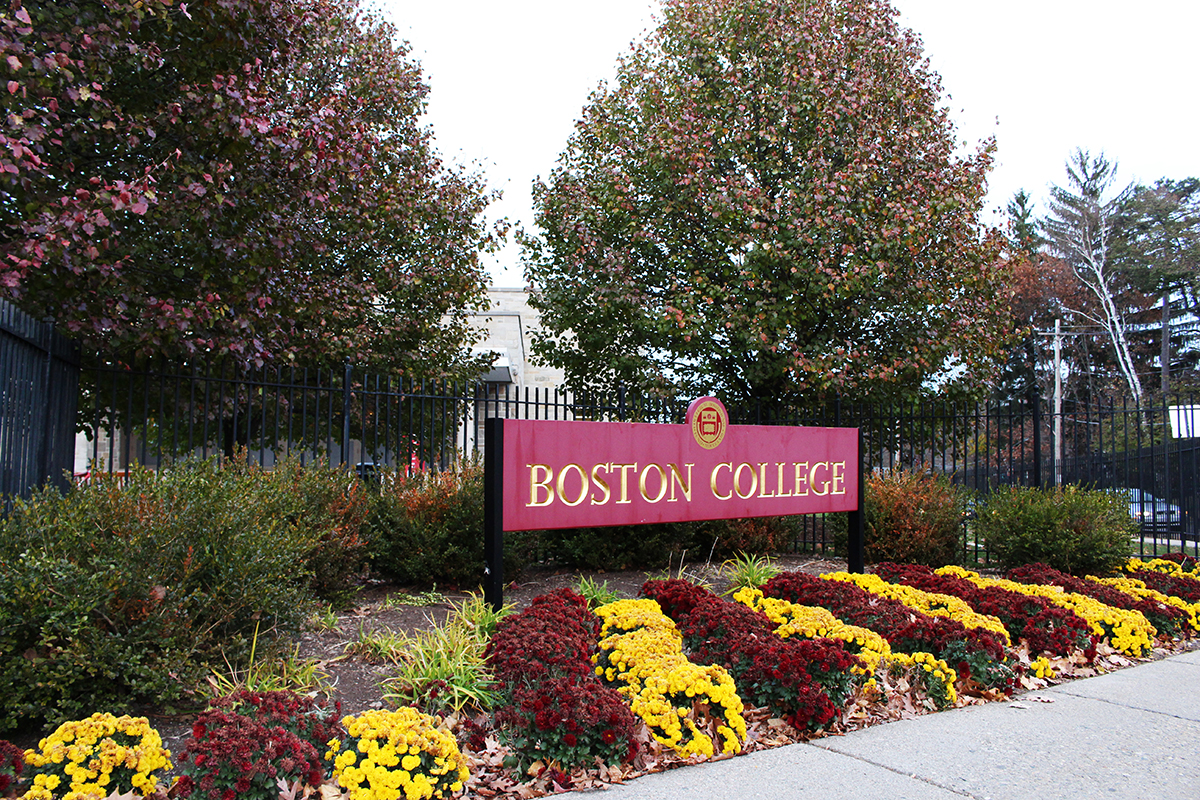Divestment Activists Target Boston College’s Admitted Students Day

Photo by Margaret Burdge
This weekend, hundreds of high schools students who’ve been admitted to Boston College will visit campus as they move toward locking in a decision for where to spend the next four years of their lives. Sunday’s “Admitted Eagle Day” is the school’s final pitch that Chestnut Hill is the academic promised land that molds and enlightens young leaders.
However, off-campus climate change activists are determined to disrupt the day and expose prospective students and their tuition-paying parents to what they claim is an administration bent on stifling freedom of expression among the student body through harsh disciplinary actions and Kafkaesque regulations.
“The purpose of admitted students day is to project a certain image of the school, and in the case of Boston College, Catholic values are a big part of that image,” says Emily Kirkland of the Cambridge-based Better Future Project, a nonprofit working to support grassroots movements aimed at getting institutions to divest from fossil fuels. “We think admitted students should know that the administration lives up to some of the values, but it also lets them fall to wayside when it suits them.”
Kirkland is heavily involved in organizing this weekend’s demonstration, which has not been sanctioned by the university, and says more than 250 people have RSVPed.
Boston College students committed to this cause, however, will not be joining in the activities. It’s not that they don’t want to, it’s that the risk of disciplinary action is too great, according to sophomore sociology major Zack Muzdakis.
On Wednesday, the administration rejected an application submitted by Muzdakis on behalf of a group called Climate Justice at Boston College. They were seeking permission to host a peaceful gathering on campus this Sunday focused on fossil fuel divestment. Muzdakis says Thomas Mogan, dean of students, rejected the application because Climate Justice at Boston College isn’t an officially recognized student organization. Therein lies the rub.
Muzdakis and others say that they have taken every step possible to become a registered student organization only to be stonewalled and routed through a maze of ambiguous procedures that seemingly change on a whim. They have gathered nearly 2,000 signatures on a petition calling for divestment. They were successful in getting the Undergraduate Student Government to approve legislation in 2013 calling on the administration to divest from fossil fuels. Yet months later the same legislative body rejected the group’s application to become an officially recognized student organization.
The consequences of running with an unofficial student group are real. On Valentine’s Day, Climate Justice at Boston College organized approximately 45 people to march through campus with signs calling for divestment. They sang a few songs and held a candle vigil in front of the president’s office. As a result, several students faced disciplinary action for participating in “an unauthorized demonstration that violates the student demonstration policy.” A letter warns that any further violations, such as participating in this weekend’s events, “will be dealt with more severely.”
Bobby Wengronowitz, a sociology PhD candidate and a founding member of Climate Justice at Boston College, was on the receiving end of such a letter after the February gathering. And while he dearly wants to participate in this weekend’s demonstration, he’ll be keeping a safe distance for fear of jeopardizing his family’s future.
“I would love to go, and it means the world to me that people from off campus are coming here to support it…but at this point I don’t think I can attend because I’m on disciplinary probation,” Wengronowitz says. “I earn my stipend from Boston College. I earn my health insurance from Boston College. I’m married and I just learned a few weeks ago that we’re going to have twins. That’s a serious concern.”
Boston College isn’t the only local target for divestment activists this weekend. On Sunday, the student group Divest Harvard is kicking off a weeklong blitz of activities aimed at forcing the administration to steer its $35 billion endowment away from fossil fuels.
It will be interesting to see how the situation up at Chestnut Hill unfolds. Rather than concede to a sanctioned demonstration led by enrolled students, the BC administration could potentially find itself countering hundreds of protesters with no formal affiliation to the institution.
Kirkland of Better Future Project says it’s unclear if the administration will block access to campus or if it will allow them to march freely. Boston College did not reply to several requests for comment for this story.
“As off-campus supporters of divestment, we will absolutely be at BC on admitted students day, permit or no permit,” Kirkland says. “The administration needs to know that no matter how many permits they reject, no matter how many students they put on probation, the divestment issue isn’t going anywhere.”


